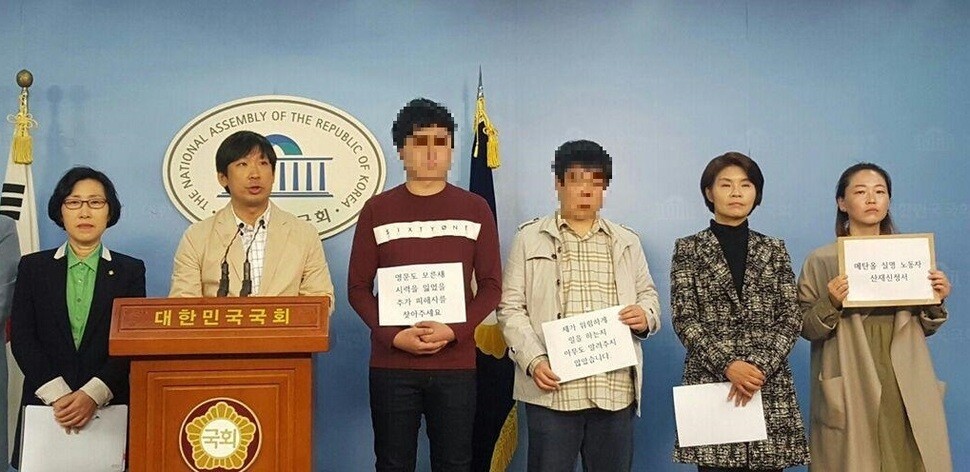hankyoreh
Links to other country sites 다른 나라 사이트 링크
Subcontractor workers at factories that supply Samsung and LG left blinded by chemicals

At a press conference on Oct. 12 at the National Assembly press center in Seoul, a 29-year-old surnamed Kim said, “I summoned the courage in the hopes that there wouldn’t be any more victims like me.” Kim was speaking to demand industrial accident insurance coverage after he lost his eyesight from poisoning with toxic methyl alcohol (methanol).
Kim had originally hoped to become a barista. After completing his mandatory military service, he worked for one year at a security company before joining a dispatch labor agency in Jan. 2015. The agency placed him on the night shift, working from 9 pm to 7:30 am at “D,” a company in Bucheon, Gyeonggi Province, that produced parts for mobile phones.
“It was a good job. I earned 2 million won (US$1,770) a month, twice as much as I’d made at the security company,” Kim recalled.
A tertiary subcontractor for Samsung Electronics, the company shaved aluminum to make mobile phone buttons and backplates. Manufacturing companies are prohibited by law from employing dispatch labor, which made Kim’s hiring illegal.
A liquid with an alcohol smell was continuously sprayed on the container belt carrying the mobile phone parts. The fluid was methanol. The law requires the use of safety goggles and protective breathing equipment when handling methanol, but Company D only supplied Kim with cotton work gloves and disposable face masks. After three weeks of work, he began suffering from shortness of breath and blurry vision, prompting him to visit a hospital on Feb. 22. He was diagnosed with optic neuritis - but the true condition was methanol poisoning. Today, he cannot see out of his right eye and retains only 10% of his vision in his left.
“I thought it was the company’s responsibility, since I‘d been injured on the job,” Kim said. “But we didn’t have industrial accident insurance, and I wasn‘t sure I could win fighting the company by myself.”
The problem was that the company didn’t have industrial accident insurance - and Kim did not know until recently that even illegal dispatch workers could apply for coverage. On Oct. 12, Kim did apply for coverage with the Korean Workers’ Compensation and Welfare Service with the help of the group Solidarity for Workers’ Health.
“The company told me [my condition] didn‘t fall under industrial accident insurance coverage and said there was ’no other option‘ besides a settlement,” said a fellow applicant, a 35-year-old surnamed Jeon. Jeon went to work in Sep. 2015 at a company identified by the initial “B” in Incheon’s Namdong Industrial Complex. On Jan. 22, 2016, he collapsed and was taken to the emergency room. Company B is a subcontractor making mobile phone parts for Samsung Electronics and LG Electronics. Jeon‘s dispatch agency offered him 2 million won to convince him to settle; after repeated calls to his family members, Jeon finally agreed.
At the time, a string of cases of blinding by methanol poisoning had prompted the Ministry of Employment and Labor to conduct a special review of companies that had been discovered using the chemical. Company B falsely claimed it had not been using methanol, but after methanol poisoning cases emerged, it was belatedly targeted for focused guidance and review. The ministry tracked and investigated 266 workers at three companies where methanol poisoning cases had been reported - but Kim and Jeon were not among them.
“The Ministry of Employment and Labor needs to adopt countermeasures, such as making another attempt to identify the dispatch company workers employed at workplaces where cases occurred and providing them with special health screenings,” said Minjoo Party of lawmaker and National Assembly Environment and Labor Committee member Han Jeoung-ae.
By Jeong Eun-joo, staff reporter
Please direct questions or comments to [english@hani.co.kr]

Editorial・opinion
![[Editorial] Does Yoon think the Korean public is wrong? [Editorial] Does Yoon think the Korean public is wrong?](https://flexible.img.hani.co.kr/flexible/normal/500/300/imgdb/original/2024/0417/8517133419684774.jpg) [Editorial] Does Yoon think the Korean public is wrong?
[Editorial] Does Yoon think the Korean public is wrong?![[Editorial] As it bolsters its alliance with US, Japan must be accountable for past [Editorial] As it bolsters its alliance with US, Japan must be accountable for past](https://flexible.img.hani.co.kr/flexible/normal/500/300/imgdb/original/2024/0417/6817133413968321.jpg) [Editorial] As it bolsters its alliance with US, Japan must be accountable for past
[Editorial] As it bolsters its alliance with US, Japan must be accountable for past- [Guest essay] Amending the Constitution is Yoon’s key to leaving office in public’s good graces
- [Editorial] 10 years on, lessons of Sewol tragedy must never be forgotten
- [Column] A death blow to Korea’s prosecutor politics
- [Correspondent’s column] The US and the end of Japanese pacifism
- [Guest essay] How Korea turned its trainee doctors into monsters
- [Guest essay] As someone who helped forge Seoul-Moscow ties, their status today troubles me
- [Editorial] Koreans sent a loud and clear message to Yoon
- [Column] In Korea’s midterm elections, it’s time for accountability
Most viewed articles
- 1[Column] The clock is ticking for Korea’s first lady
- 2Samsung barricades office as unionized workers strike for better conditions
- 3[Editorial] When the choice is kids or career, Korea will never overcome birth rate woes
- 4[News analysis] After elections, prosecutorial reform will likely make legislative agenda
- 5S. Korea, Japan reaffirm commitment to strengthening trilateral ties with US
- 6Why Israel isn’t hitting Iran with immediate retaliation
- 7[Guest essay] How Korea turned its trainee doctors into monsters
- 8Japan officially says compensation of Korean forced laborers isn’t its responsibility
- 9[Editorial] Does Yoon think the Korean public is wrong?
- 10[Editorial] 10 years on, lessons of Sewol tragedy must never be forgotten